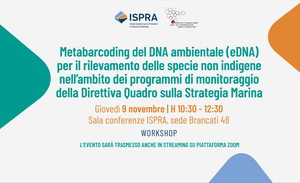Metabarcoding of environmental DNA (eDNA) for the detection of non-indigenous species in the context of Marine Strategy Framework Directive monitoring programs
As part of the three-year agreement 2021-2023 between the Ministry of the Environment and Energy Security, ISPRA and ARPA Lead partner for the implementation of Legislative Decree 190/2010 which transposes the European Framework Directive on Marine Strategy (Directive 2008/56 /EC), ISPRA in collaboration with the CoNISMa-UO Polytechnic University of Marche, the Edmund Mach Foundation and the ARPA has developed an environmental DNA metabarcoding protocol for the detection of non-indigenous species and the analysis of biodiversity, such as integrative and support tool for the traditional monitoring already foreseen for the Marine Strategy.
The adopted protocol allowed the investigation of a wide spectrum of taxonomic groups, from Chromista to Chordata. The results obtained will be presented and discussed during the Workshop, highlighting the critical issues and potential of the methodology, as well as the prospects for their future use.
- https://development.isprambiente.gov.it/en/archive/ispra-events/2023/11/metabarcoding-of-environmental-dna-edna-for-the-detection-of-non-indigenous-species
- Metabarcoding of environmental DNA (eDNA) for the detection of non-indigenous species in the context of Marine Strategy Framework Directive monitoring programs
- 2023-11-09T10:30:00+01:00
- 2023-11-09T12:30:00+01:00
- As part of the three-year agreement 2021-2023 between the Ministry of the Environment and Energy Security, ISPRA and ARPA Lead partner for the implementation of Legislative Decree 190/2010 which transposes the European Framework Directive on Marine Strategy (Directive 2008/56 /EC), ISPRA in collaboration with the CoNISMa-UO Polytechnic University of Marche, the Edmund Mach Foundation and the ARPA has developed an environmental DNA metabarcoding protocol for the detection of non-indigenous species and the analysis of biodiversity, such as integrative and support tool for the traditional monitoring already foreseen for the Marine Strategy. The adopted protocol allowed the investigation of a wide spectrum of taxonomic groups, from Chromista to Chordata. The results obtained will be presented and discussed during the Workshop, highlighting the critical issues and potential of the methodology, as well as the prospects for their future use.
- When Nov 09, 2023 from 10:30 AM to 12:30 PM (Europe/Berlin / UTC100)
- Where Online event
-
Add event to calendar
iCal

